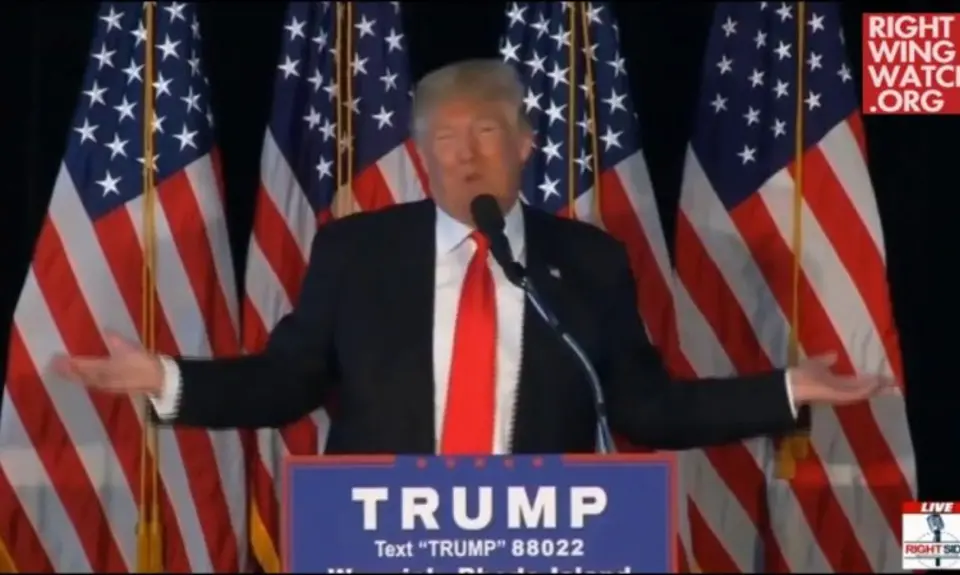Donald Trump’s escalated rhetoric about the election being stolen has resulted in condemnations from across the political spectrum. Things have gotten so out of hand that Republican leaders, including Speaker of the House Paul Ryan, have felt compelled toclarify that they don’t believe the election is being rigged.
South Carolina Sen. Lindsey Graham, a #NeverTrump Republican, told CNN, “I don't think it's good for democracy to have a major candidate for president doubt the outcome” of the election.
But this is exactly what the Republican Party has been doing for years.
But this is exactly what the Republican Party has been doing for years.
Suggesting that the election is being rigged might, in fact, be Trump’s most mainstream Republican pronouncement to date. In election cycle after election cycle, Republican Party leaders and strategists, in an effort an effort to delegitimize the election of Democratic candidates and push for more restrictive voting laws, have warned voters that ballot boxes are being stuffed with illegally cast votes. Trump is simply taking advantage of the falsehoods that conservative leaders have been planting in the minds of voters for years. (I wrote extensively about this in my book Lies, Incorporated: The World of Post-Truth Politics.)
Four years ago, in May of 2012, Republican Party Chairman Reince Priebus told the Milwaukee Journal Sentinel, “I'm always concerned about voter fraud, you know, being from Kenosha, and quite frankly having lived through seeing some of it happen. Certainlyin Milwaukee we have seen some of it, and I think it's been documented. Any notion that's not the case, it certainly is in Wisconsin. I'm always concerned about it, which is why I think we need to do a point or two better than where we think we need to be, to overcome it.”
I'm always concerned about voter fraud, you know. - Reince Priebus
Four years earlier, in October of 2008, the Washington Post reported, “In a conference call, [John] McCain campaign manager Rick Davis said the reports about investigations of the community organizing group ACORN (the Association of Community Organizations for Reform Now) suggested ‘rampant voter fraud as it relates to voter registration.’”
The mythology stuck. In 2012, according to PPP Polling, 49 percent of Republicans believed that ACORN had stolen that year's presidential election for Barack Obama, even though the group no longer existed. This was slightly down from 2008, when 52 percent of Republicans believed ACORN was responsible for the theft of the election.
Republicans have used these claims to justify spending millions of dollars on fruitless criminal investigations that have universally failed to find evidence of widespread voter fraud. Instead they discovered a small number of minor incidents that were mostly the result of errors or lack of knowledge about voting rules, and attempted to use these as excuses to disenfranchise entire swathes of voters.
During the Bush administration, the Justice Department made prosecuting voter fraud a priority. Yet only 86 people were ever convicted and even those convictions hardly showed evidence of a widespread voter fraud conspiracy. According to The New York Times, “many of those charged by the Justice Department appear to have mistakenly filled out registration forms or misunderstood eligibility rules, a review of court records and interviews with prosecutors and defense lawyers show.”
In some cases presiding judges were mystified as to why the federal government was even bringing these cases. In one instance, Kimberly Prude spent more than a year in prison for mistakenly violating the law by voting while on probation. “I find this whole prosecution mysterious,” said Judge Diane P. Wood during a hearing in Prude’s case. “I don’t know whether the Eastern District of Wisconsin goes after every felon who accidentally votes. It is not like she voted five times. She cast one vote.”
Other voter fraud investigations have been similarly wastes of taxpayer money and public officials’ time. Iowa’s Republican secretary of state, Matt Schultz, spent $250,000 in 2011 to investigate allegations of voter fraud. Ultimately, according to the Des Moines Register, he found just 117 cases of what he said were illegally cast ballots in a state where more than 1 million people vote. This resulted in just six convictions.
One of these cases occurred when a mother cast a ballot on behalf of her daughter who was away at school. Upon learning her daughter had previously voted in the election at her out-of-state university, the mother self-reported the infraction to local officials and paid a fine of $147.75.
Across the country, Republican officials investigating voter have fraud found similar results. An investigation into the 2012 election in Ohio found 135 potential fraudulently ballots out of more than 5.6 million votes cast.
In South Carolina an investigation into zombie voters, who rise from the grave and vote after death, was similarly fruitless. An 18-month investigation by the state could not turn up a single case of “illegal activity.”
When Trump makes pronouncements at campaign rallies and on Twitter about the election being rigged, he is simply following what Republicans have done for the past few election cycles, working to convince its voters that the results of elections it lost were based on a nonexistent conspiracy of fraud.





